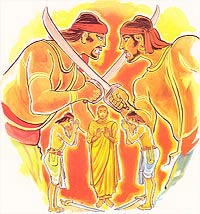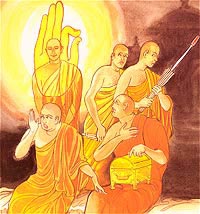41112 Sunrday LESSON 741 -Dhammapada Verse Verse 5: இப்பூவுலகில் வெருப்பை வெருப்பால் வெற்றி கொள்ள முடியாது. அன்பே வெருப்பை வெல்லும்.இதுவே வழிவந்த தம்மமாகும் -Hatred is, indeed, never appeased by hatred in this world.
It is appeased only by loving-kindness. This is an ancient law. described as eternal wisdom..406 Samaneranam
Vatthu-Him I call a brahmana, who is not
hostile to those who are hostile, who is peaceful (i.e., has laid aside the use
of force) to those with weapons, and who is without attachment to objects of
attachment.திரிபிடகம் மூன்று தொகுப்புகள் ![]() TIPITAKA- from FREE ONLINE eNālāndā Research and
TIPITAKA- from FREE ONLINE eNālāndā Research and
Practice UNIVERSITY through http://sarvajan.ambedkar.org
இப்பூவுலகில் வெருப்பை வெருப்பால் வெற்றி கொள்ள முடியாது. அன்பே வெருப்பை வெல்லும்.இதுவே வழிவந்த தம்மமாகும்.
நஹி வெரேன வெரானீ -
ஸம்மன் தீத குதாசனங்
அவேரென ச ஸம்மந்தீ -
ஏ ஸ தம்மோ ஸனந்தனோ
கலயக்கினியின் கதை

Verse 5. Hatred is Overcome Only by Non-hatred
Never here by enmity
are those with enmity allayed,
they are allayed by amity,
this is the timeless Truth.
Explanation: Those who attempt to conquer hatred by hatred
are like warriors who take weapons to overcome others who bear arms.
This does not end hatred, but gives it room to grow. But, ancient
wisdom has advocated a different timeless strategy to overcome hatred.
This eternal wisdom is to meet hatred with non-hatred. The method
is of overcoming hatred through non-hatred is eternally effective.
That is why that method is described as eternal wisdom.
Dhammapada Verse 5
Kalayakkhini Vatthu
Na hi verena verani
sammantidha kudacanam
averena ca sammanti
esa dhammo sanantano.
1
Verse 5: Hatred is, indeed, never appeased by hatred in this world. It is
appeased only by loving-kindness. This is an ancient law.
1. esa dhammo sanantano: This is the same as “poranako dhammo,”
the doctrine followed by the Budhha and his disciples. The exhortation is not to
return hatred for hatred but to conquer it by loving-kindness (absence of
hatred).
The Story of Kalayakkhini
While residing at the Jetavana monastery in Savatthi, the Buddha uttered
Verse (5) of this book, with reference to a certain woman who was barren, and
her rival.
Once there lived a householder, whose wife was barren; later he took another
wife. The feud started when the elder wife caused abortion of the other one, who
eventually died in child birth. In later existences the two were reborn as a hen
and a cat; a doe and a leopardess; and finally as the daughter of a nobleman in
Savatthi and an ogress named Kali. The ogress (Kalayakkhini) was in hot pursuit
of the lady with the baby, when the latter learned that the Buddha was nearby,
giving a religious discourse at the Jetavana monastery. She fled to him and
placed her son at his feet for protection. The ogress was stopped at the door by
the guardian spirit of the monastery and was refused admission. She was later
called in and both the lady and the ogress were reprimanded by the Buddha. The
Buddha told them about their past feuds as rival wives of a common husband, as a
cat and a hen, and as a doe and a leopardess. They were made to see that hatred
could only cause more hatred, and that it could only cease through friendship,
understanding and goodwill.
Then the Buddha spoke in verse as follows:
| Verse 5: Hatred is, indeed, never appeased by hatred in this world. It is appeased only by loving-kindness. This is an ancient law. |

Verse 406. A Brahmana Is He Who Is Friendly Amongst The Hostile
Among the hostile, friendly,
among the violent, cool
detached amidst the passionate,
that one I call a Brahmin True.
Explanation: Being friendly even among the hostile. Free from
hostility, violence and passionate grasping, one emerges a true brahmin.
Dhammapada Verse 406
Samaneranam
Vatthu
Aviruddham viruddhesu
attadandesu nibbutam
sadanesu anadanam
tamaham brumi brahmanam.
Verse 406: Him I call a brahmana, who is not
hostile to those who are hostile, who is peaceful (i.e., has laid aside the use
of force) to those with weapons, and who is without attachment to objects of
attachment.
The Story of Four Samaneras
While residing at the Jetavana
monastery, the Buddha uttered Verse (406) of this book, with reference to four
samaneras who were arahats.
Once, the wife of a brahmin sent
her husband the brahmin to the Jetavana monastery to invite four bhikkhus to an
alms-meal at their house. She told him to specifically request for senior
bhikkhus who were also true brahmanas. But four seven year old arahat samaneras,
viz., Samkicca, Pandita, Sopaka and Revata were sent along with him. When his
wife saw the young samaneras she was very much dissatisfied and blamed the
brahmin for bringing such young samaneras who were even younger than her
grandson. She was, in fact, furious with her husband, and so she sent him back
to the monastery to get older bhikkhus. In the meantime she refused to give the
young samaneras the higher seats reserved for the bhikkhus; they were given
lower seats and she did not offer them alms-food.
When the brahmin arrived at the
monastery, he met the Venerable Sariputta and invited him to his house. When the
Venerable Sariputta arrived at the house of the brahmin, he saw the four young
arahat samaneras and asked them if they had been offered alms-food yet. On
learning that the arahat samaneras had not been given alms-food yet and also
that food had been prepared only for four persons the Venerable Sariputta
returned to the monastery without accepting alms-food from the house of the
brahmin. So his wife sent the brahmin back again to the monastery to get another
senior bhikkhu. This time, the Venerable Maha Moggallana came along with the
brahmin, but he also returned to the monastery without accepting alms-food when
he learned that the young samaneras had not been offered alms-food and also that
food had been prepared only for four persons.
By this time, the samaneras were
feeling hungry. Sakka, king of the devas, seeing the state of things took the
form of an old brahmin and came to the house. The brahmin and his wife paid
respect to the old brahmin and offered him a seat of honour, but Sakka just sat
on the ground and paid respect to the four samaneras. Then he revealed that he
was Sakka. Seeing that Sakka himself was paying respect to the young samaneras,
the brahmin couple offered alms-food to all the five. After the meal, Sakka and
the samaneras manifested their supernormal power by going right up into the sky
through the roof. Sakka went back to his celestial abode, the samaneras returned
to the monastery.
When other bhikkhus asked the
samaneras whether they did net get angry when the brahmin couple refused to
offer alms-food to them, they answered in the negative. The bhikkhus not
believing them reported to the Buddha that the four young samaneras were falsely
claiming to be arahats. To them the Buddha said, “Bhikkhus, arahats bear
no ill will towards those who are hostile to them.”
Then the Buddha spoke in verse as
follows:
| Verse 406: Him I call a brahmana, who is not hostile to those who are hostile, who is peaceful (i.e., has laid aside the use of force) to those with weapons, and who is without attachment to objects of attachment. |